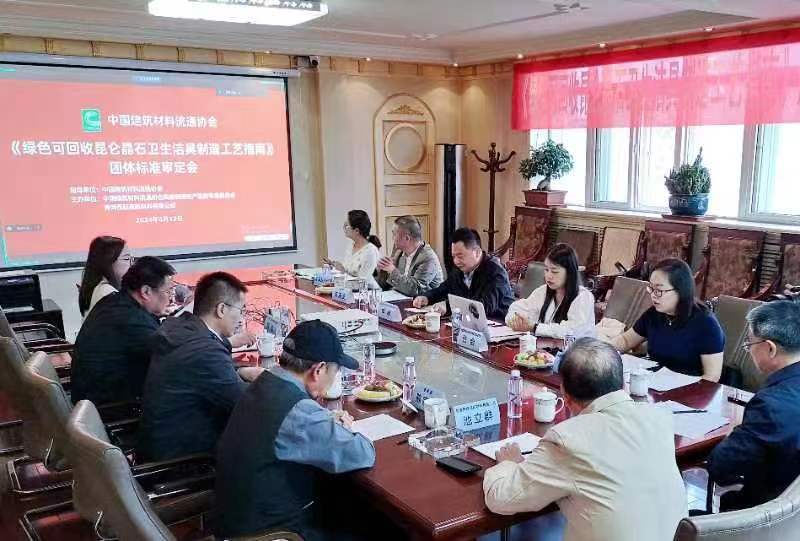The group standard of "Carbon Neutralized and Recyclable Kunlun Crystal Sanitary Ware Manufacturing Process Guide" was approved
On June 12, the group standard of the "Carbon Neutralized and Recyclable Kunlun Crystal Sanitary Ware Manufacturing Process Guide" was approved, which will further standardize the production process of Kunlun crystal sanitary ware products, ensure the quality stability and reliability of the sanitary ware products, and ensure the manufacturing process meets green and low-carbon requirements.

The approval meeting was hosted by the China Building Materials Circulation Association as the guiding unit and was hosted by the Ceramic Manufacturing and Production Service Professional Committee of the China Building Materials Circulation Association and Qinghai Xiwang High-tech Materials Co., Ltd.(hereinafter referred to as "Xiwang Industry"). Qin Zhanxue, President of the China Building Materials Circulation Association, Wang Yuge, Chairman of the Board of Supervisors and Director of the Industry Standards Department, Zhang Hui, Director of the Network and Digital Construction Department, and Shen Chang, Deputy Secretary-General of the Association's System Doors and Windows Professional Committee, attended the approval meeting.
The "Carbon Neutralized and Recyclable Kunlun Crystal Sanitary Ware Manufacturing Process Guide" is edited by Xiwang Industrial. The expert group of the approval meeting consisted of five experts, including Chen Zongyun, visiting professor at the Residential Research Institute of Tongji University in Shanghai, Deng Xiaochuan, second-level researcher at the Qinghai Salt Lake Institute of the Chinese Academy of Sciences, Liu Yamin, senior engineer at the National Key Laboratory of Building and Sanitary Ceramics Testing, Huang Xiaobin, professor at the School of Aeronautics and Astronautics of Shanghai Jiao Tong University, and Wu Shaomei, engineer at the Soil Color Design Studio of Chancheng District, Foshan City. The editor-in-chief and representatives of participating units participating in the approval meeting were: Qinghai Xiwang High-tech Materials Co., Ltd., Baoxing County Jiarun Industrial Co., Ltd., Ningbo Meiling Mold Manufacturing Co., Ltd., Beijing Hongshi Technology Development Co., Ltd., Forsite New Materials Technology Development Co., Ltd., and Kunshan City Shengjichuan Industrial Automation Equipment Co., Ltd.
President Qin Zhanxue said at the approval meeting that the formulation of the group standard of the "Carbon Neutralized and Recyclable Kunlun Crystal Sanitary Ware Manufacturing Process Guide" aims to standardize the manufacturing process of Kunlun crystal sanitary ware and help solve the problem of traditional ceramic sanitary ware industry. Problems existing in high-energy-consuming, high-emission and high-pollution production methods. At the same time, by formulating unified standards, industry innovation and development can be promoted and the overall level of the industry can be improved. During the approval stage, the expert group elected Chen Zongyun, a visiting professor at the Residential Research Institute of Tongji University in Shanghai, as the leader of the standard approval group of the "Carbon Neutralized and Recyclable Kunlun Crystal Sanitary Ware Manufacturing Process Guide". Subsequently, the review team carefully reviewed the reporting content of the preparation team and the standard review draft and other materials submitted for review, and finally unanimously passed the review of the standard review draft. This standard will be implemented from the date of official release.
Experts said that the content of the standard is scientific, reasonable, operable, and has reached the international leading level. This group's standard has been officially numbered by the China Building Materials Circulation Association: "Carbon Neutralized and Recyclable Kunlun Crystal Sanitary Ware Manufacturing Process Guide" T/CBMCA060 -2024.
Our country is the world's largest producer, consumer and exporter of building ceramics. According to data released by the China Building Sanitary Ceramics Association, the national sanitary ceramics output in 2023 will be 186 million pieces. Up to 300 million tons of clay ore are mined across the country every year. The traditional ceramic bathroom firing process requires a large amount of energy such as coal, liquefied gas, and electricity, and requires a high temperature of 1300 ° C for long-term firing. Due to the high waste rate, products after use cannot be recycled, causing environmental pollution. According to expert estimates, the carbon emissions of the building and sanitary ceramics industry are approximately 140 million tons to 200 million tons per year, accounting for 1.5% to 2.0% of the country's total carbon emissions. The industry is listed as "high pollution, high emissions, and high energy consumption". Chi Liqun, chairman of Xiwang Industrial, introduced at the approval meeting that in recent years, Xiwang Industrial has revolutionized the traditional ceramic industry through new materials and new processes, and has used the rich silicon-calcium ore resources in Qinghai Province to develop a high hardness, corrosion-resistant and recyclable new composite material-"Kunlun Jingshi". Kunlun Jingshi solves the common problem of "high energy consumption, high emissions, and high pollution" in the traditional ceramic sanitary ware industry while meeting product quality and use requirements. Kunlun crystal has achieved a production and processing process of 160 ° C to 180 ° C. It does not require high-temperature firing and no waste is generated. The hardness of the product is basically the same as that of ceramic products, but the weight is only half that of similar ceramic products. Moreover, due to the special nature of new materials, future products are 100% recyclable.
According to reports, Xiwang Industrial had previously commissioned the General Notary Bank (SGS) to conduct greenhouse gas emission assessments and calculations for its three products: basins, urinals, and toilets. At the same time, the same calculation methodology was used to evaluate and calculate similar products from a famous ceramic production base in the south. The evaluation report shows that taking toilets as an example, the carbon emissions of Xiwang Industrial's production process are only 1/8 of that of traditional ceramic sanitary ware production process.







